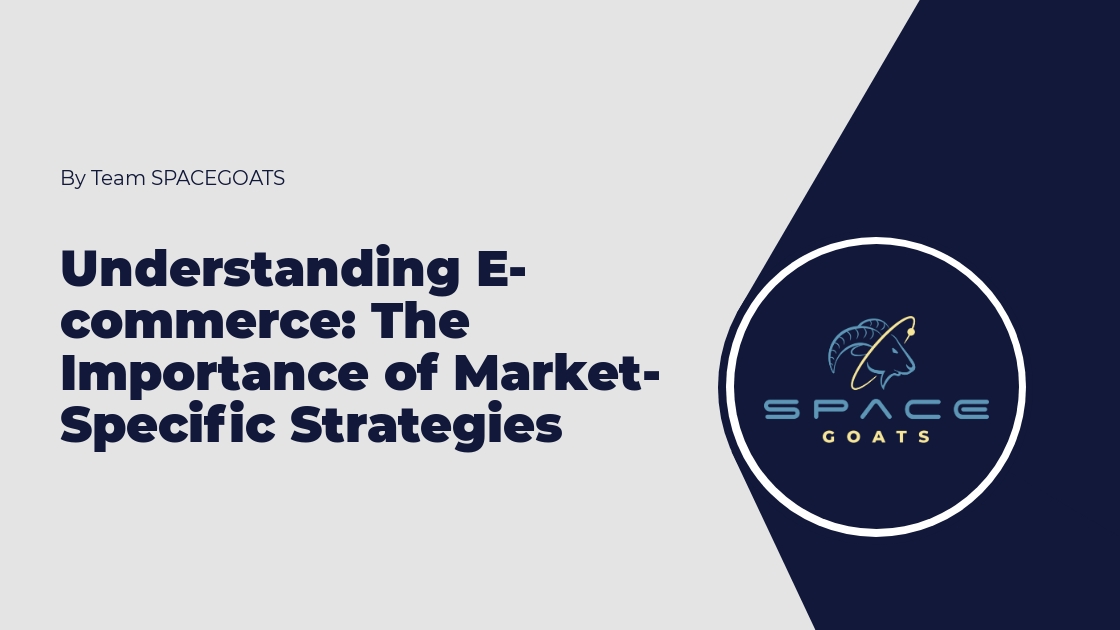Introduction to E-commerce
E-commerce refers to buying and selling products or services over the internet. It has become an integral part of modern business as more people choose to shop online. E-commerce offers convenience and a wide range of options to consumers, while also providing businesses with a platform to reach a larger audience. Whether you’re a small business owner or a big corporation, understanding the basics of e-commerce is essential for success in today’s market.
Importance of Market-Specific Strategies
Market-specific strategies are crucial in e-commerce as they allow businesses to tailor their approach to the specific needs and behaviors of their target audience, increasing their chances of success. By understanding the unique characteristics of a particular market, businesses can create customized strategies that resonate with their potential customers, leading to higher conversion rates and improved customer satisfaction. This level of personalization can help businesses stand out in a crowded market and build stronger relationships with their customer base, ultimately driving long-term success.
Understanding Target Audience
Understanding your target audience is crucial for the success of your e-commerce business. By identifying and analyzing your target audience, you can tailor your marketing strategies to meet their needs and preferences. Some key points to consider include:
- Demographics: Understanding the age, gender, income level, and geographic location of your target audience can help you create targeted marketing campaigns.
- Psychographics: Knowing the lifestyle, interests, and values of your target audience can help you create more compelling and relevant content and product offerings.
- Behaviors: Analyzing the online behavior and purchasing habits of your target audience can help you optimize your e-commerce website and create a seamless shopping experience.
By understanding your target audience, you can effectively connect with potential customers, drive sales, and build a loyal customer base.
Analyzing Market Trends and Demands
To effectively strategize for e-commerce, it’s crucial to analyze market trends and demands. This includes researching what products are currently in demand, identifying emerging trends, and understanding consumer preferences. By staying updated with market trends, e-commerce businesses can tailor their strategies to meet the needs and preferences of their target audience, ultimately increasing their chances of success.
Customizing Product Offerings
To effectively cater to your target market, it’s crucial to customize your product offerings. By tailoring your products to the specific needs and preferences of your customers, you can enhance customer satisfaction and improve your sales. This involves understanding your target audience, conducting thorough market research, and incorporating customer feedback into your product development process. By customizing your product offerings, you can create a unique selling proposition that sets you apart from competitors and attracts a loyal customer base.
Pricing and Promotion Strategies
Pricing and promotion strategies play a crucial role in the success of an e-commerce business. Here are a few essential points to consider:
- Pricing: Competitive pricing is vital to attract customers. Set prices that are appealing but still profitable. Consider offering discounts, bundle deals, or free shipping to entice shoppers.
- Promotion: Utilize social media, email marketing, and online ads to promote your products. Engage customers with special promotions, limited-time offers, and loyalty programs to drive sales and build brand loyalty. Remember, effective promotion can significantly impact your sales and overall business performance.
Localization and Cultural Considerations
To be successful in e-commerce, it’s crucial to understand the importance of localization and cultural considerations. Adapting your strategies to local markets helps you connect with your target audience more effectively. Here’s why:
- Understanding the local culture can help you tailor your products and marketing approaches to meet the specific needs and preferences of that market.
- Localization involves adapting your website, content, and messaging to the language and cultural norms of your target market, making it more appealing and relevant to local customers.
- By considering important cultural nuances, such as holidays, traditions, and taboos, you can avoid potential missteps and build trust with local customers.
- Creating market-specific strategies can help you establish a strong presence in different regions and ultimately drive higher conversion rates and customer loyalty.
E-commerce Platforms and Technologies
When it comes to e-commerce platforms and technologies, it’s important to understand the various options available. Some common e-commerce platforms include Shopify, WooCommerce, and Magento. These platforms offer different features and pricing, so it’s essential to choose the one that best suits your business needs. Additionally, technologies such as mobile optimization, artificial intelligence, and virtual reality are becoming increasingly important for e-commerce success. It’s crucial to stay updated on the latest technologies to ensure a competitive edge in the e-commerce market.
Market-Specific Marketing Channels
When it comes to e-commerce, using market-specific marketing channels is crucial. These channels are tailored to specific markets to ensure that your products or services reach the right audience. By utilizing market-specific marketing channels, you can effectively target customers in different geographical locations or with specific interests. This strategy allows for more personalized and targeted marketing efforts, resulting in higher engagement and sales.
Conclusion and Summary
When it comes to e-commerce, it’s important to remember that a one-size-fits-all approach doesn’t work. Market-specific strategies are crucial for success. By tailoring your strategies to the specific needs and preferences of your target market, you can increase your chances of standing out in a crowded online marketplace, attracting more customers, and ultimately driving more sales. Understanding the unique characteristics of each market you operate in allows you to make informed decisions and adapt your approach accordingly. By doing so, you can position your e-commerce business for sustained growth and success.

